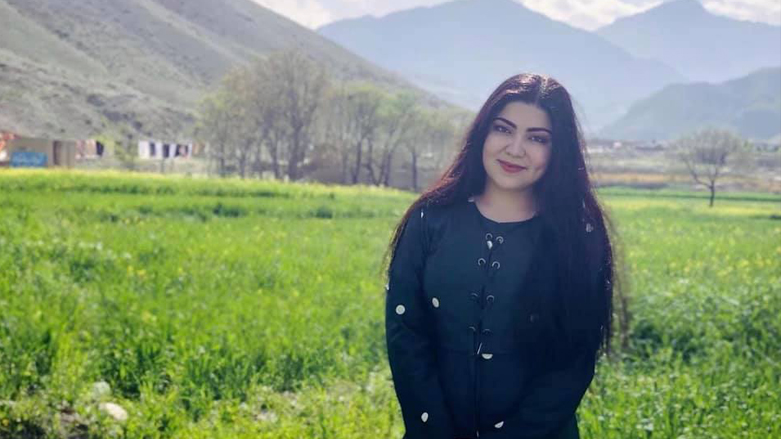Taliban depriving women of their most basic rights, female Afghan artist says

ERBIL (Kurdistan 24) – Zahra Sayeedi, 23, a female artist living in Kabul, Afghanistan, told Kurdistan 24 in an online interview that the Taliban has not changed despite their assurances in recent months that they have.
"The Taliban are now asking us not to judge them too soon, but their past, the methods they have used to gain power over the years, and the current state of Afghanistan, where everything is in decline, determine everything," she said.
Sayeedi pointed out that when the Taliban were last in power, 1996-2001, they banned all education and work for women and girls.
The Taliban now claims that it will not rule Afghanistan as brutally and oppressively as it did back then, but Sayeedi is skeptical.
"Even the Ministry of Women's Affairs is closed now, which means the elimination of women’s rights and abilities," she said.
Sayeedi believes that one reason many Afghan women will acquiesce to the Taliban's subjugation of them is that they have been isolated from the rest of the world for so long that "they do not recognize their basic rights and have accepted being slaves to their men and have adopted the same way of life for future generations of girls and women."
View this post on Instagram
Sayeedi and her five sisters have been self-taught artists since childhood and received awards for their work. Her art includes everything from drawings and paintings to calligraphy.
At first, art was just a hobby until it became their official job in 2017. However, Sayeedi says she can no longer continue her work as an artist in Afghanistan.
"On the one hand, artistic profession (all forms of it) is not acceptable for Taliban, and it is forbidden (haram) under their strict laws," she said. "On the other hand, women are not allowed to work in any job."
By banning women from the workplace, Sayeedi says the Taliban are depriving them of their basic humanity.
"Women will be totally deprived of their human rights," she said. "It means not only that we can no longer work, but that here we can no longer be human. This means gradual death and destruction for women and society as a whole."
While the Taliban had claimed they would preserve women's rights, Sayeedi pointed out that since the group retook power in August, they have not reopened girls' schools. Boys’ schools, on the other hand, have already reopened.
Although she feared the return of Taliban rule, Sayeedi remained in Kabul during the US withdrawal in August.
"People were somewhat aware of the growing power of the Taliban, but the rapid withdrawal of US troops shocked everyone," she said.
Sayeedi recalled that the former Afghan government led by President Ashraf Ghani had promised the people that it would resist until the last moment.
"So, the Taliban's rapid takeover of different parts of Afghanistan, one after another, and finally the swift collapse of the government, was another shock to everyone," she said.
"In the meantime, civilians were the ones who suffered the most irreparable losses."
Sayeedi also recalled how families had pitched tents on the road to the airport in the final weeks before the Taliban takeover. And even after ISIS threatened to attack the airport, people continued to flock there, desperate to escape the country before the August 31 US withdrawal.
"Eventually, a series of explosions happened in the airport and other parts of Kabul and many people were killed and wounded," Sayeedi said. "All of these events are historical catastrophes. It was impossible for me to leave Afghanistan in those terrible conditions."
She said until August 31, only foreign passport or green card holders were allowed to board the flights, and "after that, land and air routes were blocked, and there was no safe way to evacuate.
Even still, there are a lot of people who are trapped here and are highly at risk."
It has been difficult for Sayeedi to adapt to her new life under Taliban rule.
"None of their rules are acceptable to me and many of my compatriots," she said. "When I see how they impose their rules through force and guns, it makes me extremely angry; it's very difficult to bear."
View this post on Instagram
"Living under these imposed rules and government will be punitive for everyone in the long term. It is like when a high-flying bird is confined to a cramped cage without fulfilling its needs and eventually falling ill or dying of nostalgia, helplessness, hunger, and futility," she added.
At present, Sayeedi remains confined to her home in Kabul.
"I cannot do any special activities. Days are wasted just by worrying and nothing more," she said.
Despite the dire situation, Sayeedi still believes that Western governments can help Afghan women.
"Surely mighty Western governments can help to a great extent," she said. "In this emergency situation, they can increase their capacity to accept refugees and make the process easier, like for women who are more at risk."
She also expressed gratitude for Western volunteers that wanted to help Afghans leave their country.
"I'm so grateful for that," she said. "But the situation is so dire that all of these efforts can only cure part of this pain, whereas the main problem will remain so long as such an imposing government stays in power."
